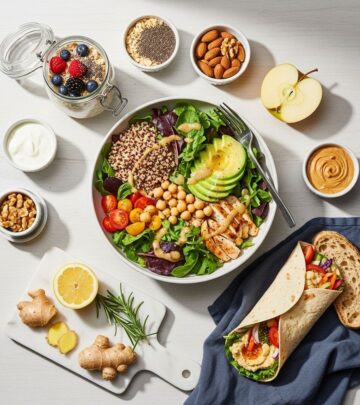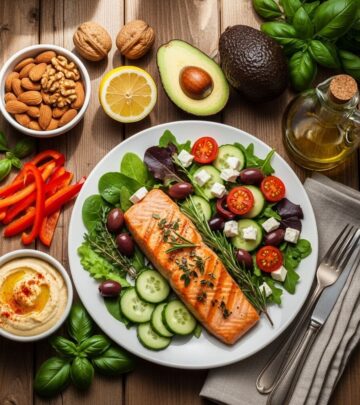Ross Mathews on Mindful Weight Loss, Balance, and Embracing Joy
Ross Mathews shares how mindful eating, self-compassion, and small wins empowered his inspiring, sustainable weight-loss journey.

Celebrity television personality Ross Mathews has spent much of his career in the limelight—from chat shows and red carpets to competing on Celebrity Big Brother and co-hosting with Drew Barrymore. But in recent years, Mathews has made headlines for a different reason: his candid, transformative journey with weight loss and wellness. Here, we dive into Mathews’ honest approach to food, self-image, and maintenance, exploring how mindfulness and joy have helped him create a healthy lifestyle that lasts.
About Ross Mathews: TV Star and Wellness Advocate
Best known for his warmth and humor, Ross Mathews has been a familiar face in Hollywood for over two decades. As he emerged as a prominent host and personality, Mathews also became vocal about his experiences with body image and his evolving relationship with food. Documenting his journey openly on social media and in interviews, he has inspired countless followers by emphasizing progress over perfection, self-kindness, and practical habits for wellness.
Letting Go of Diet Culture and Choosing Mindfulness
For Mathews, the real change began when he stepped away from restrictive diet culture and embraced mindfulness around food. He describes this shift not as a temporary ‘diet’ but as a new way of engaging with eating: “Nothing’s off-limits. The difference is, I’m mindful.” He notes that eliminating the cycle of deprivation and bingeing made food less of an adversary and more about nourishment and joy.
- No foods are forbidden. Instead, Mathews pays attention to how food makes him feel and what his body genuinely needs.
- He credits WeightWatchers for helping him develop practical tools for awareness and tracking, but ultimately, sustainable change came from self-compassion and understanding his emotional triggers.
- Mathews emphasizes the power of making small, consistent choices, rather than swinging between extremes.
The Transformation: From Rapid Loss to Lasting Maintenance
Mathews’ weight loss began during a period of immense personal change. The pandemic, the loss of his mother, and introspection about his health motivated him to reprioritize physical and mental wellness. Over time, he lost over 60 pounds, a result he says came from a mix of consistency, learning, and self-forgiveness for setbacks.
Importantly, Mathews now sees maintenance as the real victory, having stayed “in the same neighborhood of a few pounds for a couple years.” He urges others not to chase arbitrary numbers on the scale, but to look for deeper, more meaningful progress in health, confidence, and physical ability.
- Instead of using food as a reward or punishment, he found ways to embrace special treats mindfully and without guilt.
- Learning from older failed diets—such as avoiding all carbs for months, only to binge on pizza later—helped him redefine his relationship with food.
- He shares that being gentle with yourself after perceived mistakes is critical: “The floodgate of guilt doesn’t have to open. There’s always another chance to make a different choice next meal.”
Celebrating Non-Scale Victories: The Little Wins That Matter
While weight loss is often measured by pounds or clothing sizes, Mathews highlights the power of non-scale victories—the personal milestones that signal progress beyond numbers.
- Being able to run for a train and not be out of breath; fitting into a favorite shirt hanging in the closet; or feeling comfortable and energetic while socializing with friends—these are “wins” that cannot be quantified by a scale.
- He urges others to notice and celebrate these moments, trusting that physical well-being is about much more than weight alone.
- Keeping these goals in mind makes the pursuit of health feel meaningful and motivating, rather than punitive or impossible.
Building Resilience: Handling Setbacks, Social Pressure, and Self-Compassion
Mathews is quick to acknowledge that perfectionism and harsh self-talk only cause setbacks to sting more. He encourages people to let go of the “all or nothing” approach, sharing stories of past diets—like completely avoiding carbs for months only to undo his progress with a massive binge—that left him feeling shame and defeat. Instead, he advocates for resilience and curiosity after slip-ups:
- View mistakes as opportunities for self-understanding rather than evidence of failure.
- It’s not about never slipping up; it’s about what you do after. Each meal is a new chance.
- Surround yourself with supportive people who encourage your journey rather than criticize or trigger shame.
Mathews’ Tips for Long-Term Healthy Habits
- Set maintenance as a core goal. Rather than constantly trying to lose more, learn how to be content and stable.
- Small, specific targets help with consistency: daily step goals, cooking a set number of home meals, or gradually expanding physical activity.
- Your mindset matters. Don’t let the scale dictate your worth. Notice how you feel, move, and live.
- Let yourself enjoy life. Food is an important part of celebration, and mindful enjoyment is key.
Daily Practices That Make a Difference
- Keep favorite foods in your life; create versions that suit your nutritional needs if necessary.
- Track progress, but use a broad range of markers—energy, mood, clothing fit, mental sharpness, sleep, and relationships.
- Practice gratitude and humor, even when days are tough.
Cooking with Confidence: Embracing Mistakes in the Kitchen
Mathews’ love for cooking is as prominent as his love for laughter. Inspired by culinary legend Julia Child, whom he says he would most like to have cook him dinner, Mathews believes that embracing imperfection is the secret to becoming confident and creative in the kitchen.
- Letting go of fear and embarrassment allows people to try new recipes and techniques.
- “Mistakes are how you discover something new,” he asserts, echoing Child’s philosophy.
- Cooking at home not only fosters better nutrition but creates opportunities for joy, experimentation, and family connection.
Mathews shares his culinary adventures and misadventures online in his signature “Rossipes” videos, demystifying healthy cooking for his followers with candor and humor. His approach highlights simple, accessible recipes and welcomes cooks of any skill level to find their groove, get messy, and learn by doing.
Kitchen Lessons Inspired by Julia Child
- Don’t fear making mistakes—sometimes mishaps become happy accidents that bring joy or lead to a new favorite dish.
- Even the best chefs start as beginners. Persistence and playfulness in the kitchen are as important as skill.
- Food should be about pleasure, connection, and adventure—not just nutrition or discipline.
Social Media and Accountability: Connecting With Community
Mathews credits much of his consistency to engaging online and sharing openly about his progress, setbacks, and favorite “Rossipes.” Social media, he says, creates powerful accountability while also providing a network of support and encouragement.
- By posting real moments, from culinary wins to tough days, Mathews transforms isolation into connection and inspiration.
- Followers often express how his honesty helps reduce shame and encourages them to start or keep going on their own wellness journeys.
- Mathews stresses that community doesn’t only exist online: family and friends play critical roles, and it’s vital to communicate your needs, boundaries, and goals with the people in your life.
Making Fast Food and Indulgence Work for You
Mathews openly acknowledges that fast food and highly palatable snacks are everywhere, making it easy to overindulge. He shares how learning to navigate cravings, social events, and “treat” foods is part of building trust with yourself.
- Make choices, not rules: Order a favorite item and savor it, rather than eating mindlessly or with guilt.
- Use portion control and savor each bite. Plan ahead for special meals or celebrations.
- If you go overboard, try not to spiral into self-criticism. One meal or day isn’t a failure—it’s part of real life.
Looking Forward: Health and Happiness Goals
With a renewed approach to wellness, Mathews sets realistic, joy-oriented goals for the upcoming year:
- Maintain healthy routines that align with, not punish, his lifestyle and interests.
- Continue building strength, flexibility, and stamina so daily life feels lighter and more enjoyable.
- Encourage others—through media, recipes, and conversation—to embrace health journeys that make room for laughter, pleasure, and imperfection.
FAQs About Ross Mathews’ Weight Loss Journey
Q: How much weight has Ross Mathews lost and how?
A: Ross Mathews has lost over 60 pounds through mindful eating, portion control, and prioritizing self-compassion over strict restriction. He credits ongoing support systems, consistency, and building habits rather than relying on short-term diets.
Q: What does Ross Mathews mean by ‘non-scale victories’?
A: Non-scale victories refer to progress markers like increased stamina, fitting into favorite clothing, social confidence, and improved daily functioning. These are celebrated alongside or instead of the number on the scale.
Q: Who inspires Ross Mathews in the kitchen?
A: Ross Mathews cites Julia Child as a personal hero, valuing her fearless approach to cooking and willingness to embrace mistakes. He believes embracing imperfection is both liberating and instructive in the kitchen.
Q: What advice does Mathews have for those starting their own wellness journey?
A: He advises: Don’t aim for perfection—focus on small, sustainable choices, celebrate wins beyond weight, practice self-kindness, and connect with others on similar journeys. Resilience through setbacks is key to creating lasting change.
Q: Can you enjoy treats and still maintain weight loss?
A: Yes. For Mathews, allowing for mindful indulgence prevents bingeing and guilt traps. The key is making conscious choices and savoring the experience rather than restricting so harshly that it leads to feeling out of control later.
Key Takeaways From Ross Mathews’ Journey
- Letting go of all-or-nothing dieting empowers ongoing health.
- Mindful eating, self-forgiveness, and making space for joy are crucial for real, lasting wellness.
- Improvement is about resilience and adaptability—not perfection.
- Celebrate every step, big or small, on the road to well-being.
Read full bio of medha deb












